
JOURNAL OF HUMAN RESOURCES
Scope & Guideline
Uncovering strategies for effective workforce engagement.
Introduction
Aims and Scopes
- Labor Market Dynamics:
Research on employment trends, wage structures, and the impact of economic policies on labor markets, including topics such as unemployment, job training, and labor market signaling. - Education and Human Capital:
Exploration of the relationships between educational attainment, skills development, and economic outcomes, including studies on vocational training, school choice, and educational interventions. - Family and Social Structures:
Investigations into how family dynamics, gender roles, and social networks influence economic behavior and human capital development, encompassing topics like maternal employment and child outcomes. - Health Economics:
Studies examining the intersection of health and labor market outcomes, such as the effects of health policies on employment and the economic impact of mental health and well-being. - Policy Analysis and Evaluation:
Empirical evaluations of social policies and their effects on labor markets, education systems, and public health, aimed at providing evidence for effective policy-making.
Trending and Emerging
- Impact of Mental Health on Economic Outcomes:
There is a growing emphasis on understanding how mental health affects labor market participation, productivity, and overall economic well-being, highlighting the importance of mental health interventions. - Effects of Technology on Labor Markets:
Research is increasingly focusing on how technological advancements, including automation and remote work, are reshaping labor market dynamics and employment opportunities. - Intergenerational Mobility and Family Dynamics:
Studies examining the effects of family structure and socioeconomic factors on intergenerational mobility are trending, reflecting a deeper interest in how familial influences shape individual economic outcomes. - Diversity and Inclusion in the Workplace:
Emerging studies are exploring the implications of workplace diversity on organizational performance and employee outcomes, indicating a shift towards understanding the benefits of inclusive practices. - Social Safety Nets and Economic Resilience:
Research on the effectiveness of social safety nets, such as unemployment insurance and welfare programs, is becoming more prominent, particularly in the context of economic shocks and recovery.
Declining or Waning
- Traditional Labor Market Theories:
Research that primarily relied on classical economic theories of labor markets appears to be declining, as newer studies incorporate behavioral economics and experimental methodologies. - Gender Discrimination in the Workplace:
Although still a relevant topic, the frequency of papers specifically addressing gender discrimination has decreased, possibly due to a broader integration of gender issues into various labor market studies. - Longitudinal Studies of Single Factors:
The focus on longitudinal studies that isolate single factors affecting labor or educational outcomes seems to be waning, as the journal increasingly emphasizes multifactorial and interdisciplinary approaches. - Rural Labor Market Studies:
Research specifically targeting rural labor markets has diminished, reflecting a potential shift in interest towards urban labor dynamics and broader economic trends.
Similar Journals
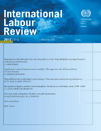
INTERNATIONAL LABOUR REVIEW
Pioneering research for a changing workforce.INTERNATIONAL LABOUR REVIEW is a prestigious academic journal published by WILEY that serves as a key resource for scholars and professionals in the fields of labour economics, human resource management, and organizational behavior. With a history dating back to 1945, the journal has evolved to publish cutting-edge research and insights, maintaining its relevance in a rapidly changing employment landscape. Its impact is illustrated by its recognition within category quartiles, placing it in Q2 for Management of Technology and Innovation, Organizational Behavior and Human Resource Management, and Strategy and Management in 2023. Researchers and practitioners especially value its empirical and theoretical contributions, which are crucial for understanding the complexities of labor and employment relations. While the journal operates under a subscription model, it is accessible to a broad audience seeking to enhance their knowledge in vital areas of labor dynamics. If you are looking to engage with influential research that shapes organizational strategies and labor policies, the INTERNATIONAL LABOUR REVIEW is an essential addition to your academic resources.
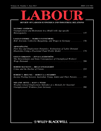
Labour-England
Advancing Knowledge on Labor Relations and DemographicsLabour-England is a renowned academic journal dedicated to the critical study of labor relations, population demographics, historical perspectives, and geographical and planning issues within the context of the United Kingdom. Published by WILEY, this journal has made a significant impact in its field, as evidenced by its various 2023 quartile rankings, including Q1 in History and Q2 in Demography. With an emphasis on interdisciplinary research, Labour-England serves as a vital resource for scholars and practitioners alike, delving into the complexities of industrial relations, organizational behavior, and human resource management. The journal's impressive convergence of research from 1987 to 2024 promises to provide historical insights alongside contemporary analyses, encouraging a deeper understanding of labor dynamics. Although not fully open access, it continues to be an essential platform for disseminating knowledge and fostering dialogue among researchers, professionals, and students engaged in these critical areas of study.

Italian Economic Journal
Advancing economic discourse through rigorous research.Italian Economic Journal is a prominent academic publication that serves as a vital platform for scholars, researchers, and practitioners in the fields of economics, econometrics, and finance. Published by Springer Heidelberg, this journal stands out with its rigorous peer-review process and commitment to disseminating high-quality research. As of 2023, it holds an impressive Q2 ranking in its category, reflecting its substantial influence and contribution to the discipline, with a Scopus rank of #102 out of 288 in General Economics, placing it in the top 64th percentile. The journal covers a diverse array of economic topics, fostering a comprehensive understanding of contemporary economic issues and methodologies. Though currently not an open-access journal, it maintains a robust reach within the academic community, encouraging a vibrant exchange of ideas and knowledge. Based in Switzerland, with its editorial address at TIERGARTENSTRASSE 17, D-69121 HEIDELBERG, GERMANY, the Italian Economic Journal is a must-read for those who seek to engage deeply with the economic challenges and innovations shaping our world from 2015 to 2024 and beyond.
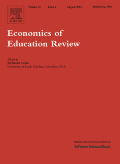
ECONOMICS OF EDUCATION REVIEW
Pioneering research at the nexus of economics and education.Economics of Education Review, published by Pergamon-Elsevier Science Ltd, is a premier journal dedicated to the intersection of educational policy and economic theory. Established in 1981, this esteemed journal has continually provided a platform for high-quality research focused on how education systems can be improved through economic analysis. With an impressive impact factor and categorized in the Q1 quartile for both Economics and Education in 2023, it ranks among the top journals in its field, boasting a Scopus rank of #480/1543 in Social Sciences - Education, highlighting its significant influence and reach. The journal is not open access, ensuring a curated selection of scholarly articles and rigorous peer review that upholds the highest academic standards. Its scope encompasses a diverse range of topics including educational finance, labor market outcomes of educational policies, and the economics of educational institutions, making it essential reading for researchers, policymakers, and practitioners committed to advancing educational quality and accessibility.

ECONOMIST-NETHERLANDS
Cultivating Knowledge for a Sustainable Economic FutureThe Economist-Netherlands, published by Springer, is a prestigious journal that has been a cornerstone in the field of economics since its inception in 1852. With a strong focus on disseminating high-quality research and insights, this journal serves as an essential resource for economists, researchers, and practitioners interested in the dynamic landscape of economic theory and applications. Currently ranked in the Q3 category in Economics and Econometrics, this journal demonstrates a commitment to scholarly rigor, as reflected in its Scopus ranking within the 55th percentile. The journal features an extensive scope that encompasses key topics relevant to both historical and contemporary economic challenges, fostering a vibrant academic discourse. While access is not open, the journal remains a vital publication for anyone seeking to advance their knowledge in the economic sector. With an enduring legacy, the Economist-Netherlands continues to contribute significantly to the evolution of economic scholarship.
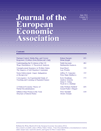
Journal of the European Economic Association
Fostering Innovative Research for a Global EconomyThe Journal of the European Economic Association, published by Oxford University Press, stands as a cornerstone in the field of economics, boasting a strong impact factor that reflects its high citation rates and significance among peers. With an impressive Scopus ranking of 12 out of 288 in general economics, encompassing a remarkable 96th percentile, this journal is recognized for its rigorous peer-reviewed research contributions that advance the understanding of economic theory and policy. Dedicated to publishing innovative studies and theoretical advancements since its inception in 2003, it continues to engage scholars worldwide, providing vital insights applicable to both academia and industry. Although it does not follow an open-access model, the journal's extensive reach and commitment to excellence make it an essential resource for researchers, professionals, and students seeking to deepen their understanding of contemporary economic issues. Based in the United States, the journal reflects a European perspective on global economic challenges, making it indispensable for those at the forefront of economic research.
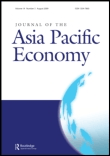
Journal of the Asia Pacific Economy
Illuminating Economic Trends Across the Asia Pacific RegionThe Journal of the Asia Pacific Economy is a leading academic journal dedicated to exploring economic, political, and social developments across the Asia Pacific region. Published by Routledge Journals, Taylor & Francis Ltd, this journal has been a pivotal platform for scholarly communication since its inception in 1996, contributing to a deeper understanding of regional dynamics through a rigorous peer-review process. With an impressive positioning in the Q2 category across multiple disciplines, including Development, Geography, Planning and Development, and Political Science and International Relations, the journal excels in disseminating high-quality research that influences policy and academic discourse. Researchers and professionals alike benefit from its accessibility and scholarly relevance, drawing from diverse methodologies and theoretical frameworks to address pressing issues of the Asia Pacific economy. As it continues to publish until 2024, the journal remains dedicated to advancing knowledge and fostering collaboration within the academic community.
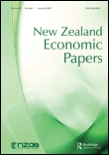
New Zealand Economic Papers
Driving impactful research for a deeper understanding of economic trends.New Zealand Economic Papers is a prominent academic journal dedicated to the field of economics, published by Taylor & Francis Ltd. With its ISSN 0077-9954 and E-ISSN 1943-4863, this journal has been a significant contributor to economic discourse since its inception in 1966, continuing to provide valuable insights through to 2024. As part of the third quartile (Q3) in the Economics, Econometrics and Finance category, it ranks at #165 out of 288 in Scopus, placing it within the 42nd percentile, demonstrating its respectable impact in the academic community. Although the journal does not offer open access, it remains a vital resource for researchers, professionals, and students interested in understanding economic dynamics, policy analysis, and applied econometrics, particularly in the context of New Zealand. The journal's commitment to rigorous research ensures that it continues to play a crucial role in shaping economic policy and academic thought across the globe.
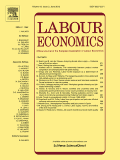
LABOUR ECONOMICS
Decoding Labor Economics for a Better TomorrowLABOUR ECONOMICS is a premier academic journal published by ELSEVIER, focusing on critical aspects of the labor market, employment, and human resource management from a rigorous economic perspective. With an impressive Q1 ranking in both Economics and Econometrics, as well as Organizational Behavior and Human Resource Management, this journal is renowned for publishing high-quality research that provides valuable insights into labor dynamics and workforce issues. Featuring an ISSN of 0927-5371 and an E-ISSN of 1879-1034, the journal has been a cornerstone of scholarly discussion since 1993, maintaining a commitment to excellence in the field. With its impact factor reflecting its relevance and influence, LABOUR ECONOMICS serves as an essential resource for researchers, professionals, and students eager to explore the intricacies of labor economics. The journal invites submissions that foster innovative discussion and advance knowledge within this vital area of study, providing a platform for groundbreaking research aimed at informed policy making and improved labor practices.
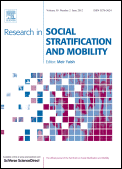
Research in Social Stratification and Mobility
Connecting research to the realities of social stratification.Research in Social Stratification and Mobility, published by Elsevier, is a premier interdisciplinary journal dedicated to advancing the understanding of social class dynamics, inequality, and mobility within contemporary societies. As a highly regarded publication in the field, this journal holds an impressive Q1 ranking in both Social Sciences (miscellaneous) and Sociology and Political Science, reflecting its significant impact and relevance. With a Scopus rank of 25 out of 604 in Social Sciences and 63 out of 1466 in Sociology and Political Science, it stands at the forefront of scholarly discourse with a percentile placement of 95th in both categories. Researchers, professionals, and students alike will find a wealth of rigorous empirical studies, theoretical discussions, and policy analyses that illuminate the complexities of social stratification and its implications on mobility trends. Although this journal is not open access, it remains a vital resource for those invested in sociological research and policy-making, offering valuable insights that contribute to the ongoing dialogue surrounding inequality and social opportunity.